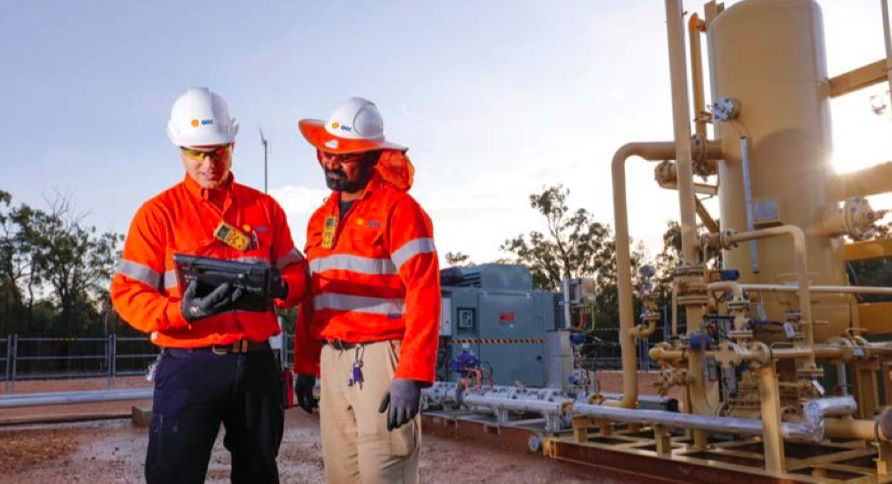As it continues the pursuit of its “new energies” strategy, oil giant Royal Dutch Shell has launched construction on its first utility-scale solar project in Australia. The 120 MW Gangarri Solar Farm will be developed on land that forms some of the company’s QGC fracking operations to reduce the carbon footprint of its Queensland gas extraction activities.
Unveiled a year ago, the solar farm located near Wandoan in South West Queensland is expected to feature about 400,000 PV panels and create up to 200 jobs during construction. Shell Energy Australia will be the foundation customer for the project, with an equivalent amount of electricity purchased from the national grid and sold to Shell’s QGC business, reducing the company’s carbon footprint by around 300,000 tonnes a year. The project is penciled in for completion in early 2021.
“This is Shell’s first global investment in an industrial-scale solar farm, and we are proud to be investing in the ‘Sunshine State’ as a key centre of activity under Shell’s global ambition to expand our integrated power business,” Shell Australia chairman Tony Nunan said.
Welcoming Shell’s commitment, Queensland Energy Minister Anthony Lynham said on Friday the Gangarri project would show how gas as a transition fuel and clean energy assets can coexist. “With Shell sanctioning this 400,000 panel solar farm it will become part of Queensland’s clean energy revolution, which is providing the world a practical template on how to transition to low emissions future,” Lynham said.
Lynham said Shell’s PV investment follows AGL and Vena Energy’s announcement last week of Queensland’s biggest battery located a stone’s throw away from the Gangarri solar farm. The battery system will have an initial capacity of 100 MW and store 150 MWh of energy, marking the first stage of a major renewable project that could involve 1 GW solar capacity.
“The Darling Downs and South West Queensland is literally an energy powerhouse, these regions have developed the unprecedented large scale $70 billion onshore gas industry from a standing start, now it hosting some of largest clean energy generators in the country,” the minister said.
The investment follows Shell’s recent $617 million acquisition of commercial and industrial power provider ERM Power and investment in solar developer ESCO Pacific. The two acquisitions complement each other as part of Shell’s plan to use cheap solar energy to power Australian businesses, underlining the company’s vision for a world where solar meets the largest portion of primary energy demand as soon as 2050.
“Solar is one of the building blocks of Shell’s power strategy,” said Greg Joiner, Vice-President for Shell Energy in Australia. “We are increasingly incorporating renewable energy into customer offers, as we have done here for QGC, by combining renewable energy with a firmed energy solution offering reliable supply, a fixed price and a cleaner lower emission package.”
Last year, the oil giant released a strategy for the energy transition to ensure the resilience of its portfolio and later announced plans to boost annual spending on renewables and low-carbon energies to between $2 billion and $3 billion by 2025. The oil major has plans to become the world’s biggest electricity company by the 2030s.
In some of its earlier clean energy investments, Shell bought German battery storage manufacturer Sonnen, snapped up a 44% stake in U.S.-based Silicon Ranch, took over U.K. energy firm, First Utility and acquired a 49% stake in Singapore-based Cleantech Solar. It also reaffirmed its ambition to halve the net carbon footprint of its operations by 2050.
This content is protected by copyright and may not be reused. If you want to cooperate with us and would like to reuse some of our content, please contact: editors@pv-magazine.com.









1 comment
By submitting this form you agree to pv magazine using your data for the purposes of publishing your comment.
Your personal data will only be disclosed or otherwise transmitted to third parties for the purposes of spam filtering or if this is necessary for technical maintenance of the website. Any other transfer to third parties will not take place unless this is justified on the basis of applicable data protection regulations or if pv magazine is legally obliged to do so.
You may revoke this consent at any time with effect for the future, in which case your personal data will be deleted immediately. Otherwise, your data will be deleted if pv magazine has processed your request or the purpose of data storage is fulfilled.
Further information on data privacy can be found in our Data Protection Policy.